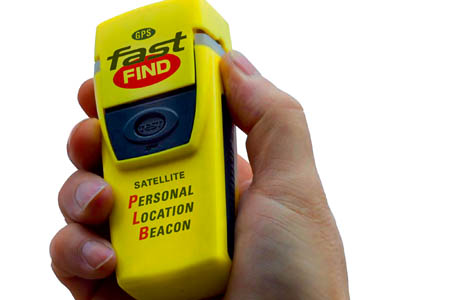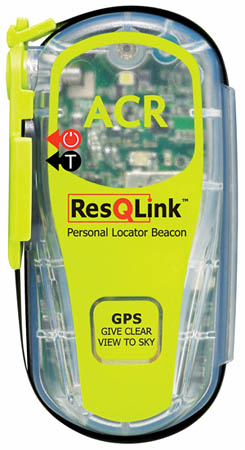Outdoor enthusiasts will for the first time be able to use personal locator beacons to send distress signals from the UK’s remote areas to an international satellite system.
New regulations come into force tomorrow, Thursday, allowing the use of PLBs on land in the UK.
Previously they were only approved for use at sea and on aircraft, but now walkers, mountaineers, mountain bikers and other outdoor fans will be able to buy and use the pocket devices for use in an emergency.
Two companies are already pitching their devices at new users, with ACR’s ResQLink launching at the first day of the Outdoors Show in London’s East End tomorrow, and McMurdo’s Fast Find also being sold as ideal for outdoor enthusiasts.
Both handheld devices use the Cospas Sarsat system of orbiting rescue satellites, meaning no subscription is necessary to use the 406MHz service.
The ResQLink is approved for sale in 14 European countries and combines GPS positioning, a 406MHz signal and 121.5 MHz homing capability and has a reusable antenna.
ACR said: “The waterproof ResQLink broadcasts a unique registered distress signal that not only tells rescuers where the sender is, but who they are.
“The onboard 66 channel GPS can quickly fix the sender’s position to within 100m and then utilises a powerful 406MHz signal to relay the distress call to orbiting satellites.
“As local search and rescue is deployed, a separate homing signal and integrated LED strobe light guide rescuers to the sender’s exact position.”
Two built-in tests allow users to check the ResQLink is functioning and ready for use. A push-button facility allows users to test internal electronics and GPS functionality.
The company said advances in circuit board design and power management have allowed for a smaller battery pack and continuously operating strobe.
It added: “A PLB is a satellite-signalling device of last resort, for use when all other means of self-rescue have been exhausted and where the situation is deemed to be grave and imminent, and the loss of life, limb, eyesight or valuable property will occur without assistance.
“All beacons must be registered. There are no monthly service fees required for 406MHz beacons.”
The McMurdo Fast Find similarly uses a 121.5MHz homing signal to enable search and rescue teams to home in on the beacon once in the vicinity and is also subscription free.
It also has a multi-channel GPS to give precise location co-ordinates with a Fast Find 210 GPS PLB able to be determined to a typical positional accuracy of +/-62m within a few minutes of activation.
The beacon is waterproof to 10m, will operate in temperatures as low as – 20C and weighs 150g, measuring 34mm x 47mm x 106mm which McMurdo said makes it easy to carry tucked in to a pocket or on a belt.
Ross Wilkinson, global sales director of McMurdo Ltd, said: “We have been campaigning for a number of years to permit the use of PLBs on land in the UK, which have been permitted for use in the maritime and aviation environments, as well as on land in numerous countries around the world for many years.
“The Fast Find 210 PLB has been instrumental in a vast number of documented rescues around the world from bear attacks in Alaska to climbers in New Zealand. In 2010 alone 2,338 people were rescued in 641 distress situations globally using information provided by the Cospas Sarsat system.
“This change in legislation is a real breakthrough in the safety of outdoor enthusiasts venturing in to remote areas of the UK. Thanks to the beacon’s multi-channel GPS, which gives precise location co-ordinates to the search and rescue services, the Fast Find takes the ‘search’ out of ‘search and rescue’ and will ultimately reduce costs to these emergency responders.”
Once activated, the Fast Find will transmit continuously for a minimum of 24 hours at a 5W output and also features a LED flash light to assist with rescues at night or during limited visibility. The beacon is easy to activate with a simple three-stage activation function, which prevents accidental activation, and it contains a replaceable battery with 5 years storage life.
It retails at £270 including VAT.


Outdoorsman
11 January 2012Yes, I think it is a real step forward and puts professional and recreational land users on a par with their maritime and aviation counterparts in the UK - and UK on a level with the majority of the world's land-mass, where PLBs can already be used.
I believe the accuracy figure of the GPS refined position can be more accurately quoted as 'less than 120 metres' in the UK, not that it matters much.
Please emphasise if you can the vital necessity for REGISTRATION and that registration is FREE. Users should ideally comprehensively brief their Emergency Points of Contact (EPOC) that they provide on the registration form, of their route, itinerary, escape routes, how many in the party, etc. This is particularly so that if the UKMCC receives a 'Detect-Only' alert for that beacon, which means that they know the beacon has been activated, but no position is produced, or if the GPS-derived position has not been provided for some reason and only the (less accurate) Doppler-derived position is available, the UKMCC Operator will need to phone the EPOC(s) to get the route details and, because there are always two unresolved Doppler positions to start with, to then be able to reject one of them (or 'resolve the ambiguity', as it is called).
I know and can empathise with some outdoors enthusiasts who will be concerned that PLB carriage will become mandatory, but they are only an improvement, in some ways, over mobile phones and, only in some respects, over some other devices such as SPOT Messenger, which has advantages in other situations.
Please, if you can, urge those who buy and carry PLBs to purchase the much more capable version with integrated GPS (the so-called 'Location Protocol version).
Could it also be advised that users please consider use of their mobile phones first to try to resolve their difficulty if in network coverage, provided that time/urgency isn't a life-threatening factor (for example if they're lost but not hypothermic), but that person in difficulty should always tell the rescue authorities they have a PLB: then, if asked by the rescue services, they can activate the PLB to aid position fixing and helicopter homing. Of course, if out of mobile phone network coverage and in the sort of situation of genuine distress that the PLBs were designed for, that's what you'll have carried it for, so get on with it.
PLBs are not the answer to life, the universe and everything, but they will, if carried and used responsibly, undoubtedly help in reducing the life-endangering time necessary to recover a casualty to safety, and reduce the huge amount of voluntary MR time used in searching for lost casualties. They should save lives, time, expense and wear-and-tear on SAR men (and women) and their machines.
However, nobody, certainly not in the recreational arena in the UK, should be 'obliged' to carry one.
Let's hope there are very few occasions when they'll be needed in anger.
All the best, to users and to those who go on the hill wearing only a vest and shorts - each to his own
PeteStuart
12 January 2012The idea is not new I have had a spot messenger for the last three years, works fine.
Mo Harris
12 January 2012£270?! I got my fast find 210 PLB for £199 at Southampton Boat Show last year, I'd recommend researching a few retailers to get a good deal. Worth the price for its lifesaving potential, and you don't have to go through a call centre to get the emergency services like with spot, as the signal goes direct up to the international satellite network and the rescuers will be alerted and will come to get you. Brilliant.
Margaret
12 January 2012Can they 'really' be so necessary ?
Phil
13 January 2012Margaret has a point!
Assuming that she is thinking along the lines of there being still no substitute for common sense in most cases
Margaret
13 January 2012Sounds about right Phil. Could the unintended consequences of increased use of technology actually mean there is more for the rescue services to do.
The old concept is worth remembering - Safety benefits can rapidly become Performance benefits. As long as a button can be pressed does it really matter if common sense and good navigation skills are present.
Phil E
09 March 2013Great news. My brand new plb, which I used for sailing but no longer sail, was about to go on ebay. Now I have a use for it. They are great bits of kit. Been using them for years but others are right. They are NOT a get out of jail free card!
Paul
04 November 2014Good thing with this device is that it does not need a cellphone network to work. In Scandinavia many people who work alone in remotlocations use this devices. Rescue operation are much more effictive when PLB´s are used.